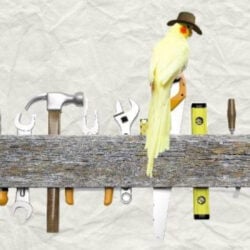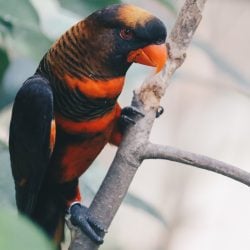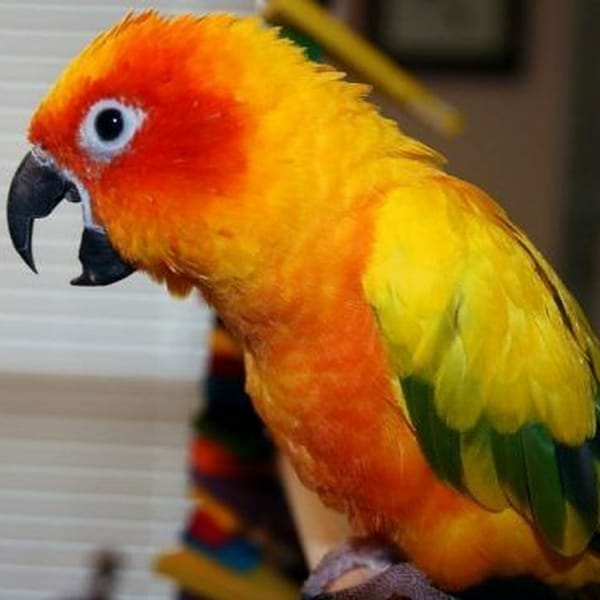Last Updated on by Mitch Rezman
Photograph courtesy of jmbead
from “comments” in a recent order confirmation email:
he is less than a year old and screams loudly when he cannot see me. I am hoping the calm herb will be effective when my neighbors are home. Or just gives me a break when i need it. I took him to my moms for christmas and she was not happy about the loudness. 🙁
desta baldwin – Order number: WCP-89743 Order Date: 1/15/2016
Hi Desta
I’ve got a couple of ideas but need a bit more info
what kind of bird ? – how do we know it’s a he? – flighted or clipped? – did mom yell “shut up” at the bird? – could you send a pic of the bird in it’s cage? – thanx mitchr
Hey mitch,
Clipped – so that he can only fly down.
I will work on the picture. But he has lots of toys. I had him a small travel version at my mom’s. She thought I had too many toys.
Is that possible? I have seen other pictures of cages with toys – and I do not think I am overcrowding him. He has interest in each corner at various levels. In the travel cage he had three small toys and a cuddle blanket.
His primary bird cage can be a about six or so – depending on the size of the toys. I have purchased different size toys from small thru large to figure out where his interests are. So far his favorite is shiny or glittery. And nothing seems to intimidate him for long.
Sparky is a young male sun conure that hatched April 2015. The breeder told me that his parents would not feed their young, so he was hand fed from the very beginning. Part of the purchase price was that they tested to see if the young bird is male or female.
I think the problem is that he is right next/across to/from me when I am watching the TV or working on my laptop. He has gotten so use to me giving him 100% attention (or the appearance of that) – so that when I am not noticeably paying attention and/or I leave the room – he is calling out to me.
I think I created the problem, since it did not start out this way. If he was a dog I would call it separation anxiety. I try to ignore him when he does it – but it is hard to avoid him when it is a one bedroom apartment. Unfortunately, I think anytime I come back in his line of sight – or he just hears me – he thinks his calling (i.e. screeching) has worked. I do reward him with a treat or attention when I come back and he did not call out. Since it is just me, I wanted him in the same room (caged or not that) I spend most of the time in when I am not at work. Sometimes, once he starts – it is like he gets on a roll – and I cannot even talk to him in a whisper (when he gets quitter) – without him getting excited and screeching again. The only way I seem to break the pattern is covering him up briefly. But sometimes that does not even work – because then he starts again before I even get him completely uncovered.
The few times he screeched when I was holding him – I said ouch ( – because it is quite loud and directly in my ear) – he would stop. I am thinking maybe acting like he is hurting me – he might stop even if in cage. Seems to be the age old problem – when is not enough attention the problem vs. too much attention the cause.
FYI. I had rescued a African grey parrot (that passed away a few years ago) from someone that had it caged in their garage. She use to scream and then yell shut up. LOL? I asked the lady about it and she said that was her yelling at it to be quiet. Over time, the African grey quit yelling.
Feathered factoid: When you yell at a bird using any words be they “shut up” or “be quiet” the bird is not cognizing words. The bird is thinking “this is great – someone’s finally talking to me – squawk – squawk – squawk” In “bird speak” you have made a request to carry on a conversation. Now you can let mom and other guests know about this counter-intuitive animal behavior.
shoulder riding is an earned privilege
I think the quiet atmosphere of my home eventually calmed her down. I am thinking that my sun conure’ s youth and natural instinct is prevailing right now, and that it will take some time for him to realize that he gets more attention when he is not breaking any piercing decimal screeching for my attention. I wanted to try the product – not as a lifelong solution – but as a tool that can be used when necessary until he learns not to screech to get what he wants.scre
I did not get the feather enhancer to mix with it, because so far he does not like corn. I just got the package today, so if he is feisty when I get home tonight I will try some of the calm stuff tonight.
Any thoughts or direction would be wonderful and very much appreciated.
Thanks.
So here’s the deal, Desta
Your issues beg many more questions. If the bird is screeching near your ear, should it not be near your ear. If he was perching on your hand near your ear and he started screeching you can try something called an “earthquake” – Change the angle of your hand rapidly putting him off balance silencing him for a moment – good for “nippy” birds too. If he is on your shoulder and screeching, he should be removed and put back in the cage as he is not earned “shoulder privileges”
but let’s back up
I’m going to guess this is what Sparky sounds like. If anyone is interested i can create an MP4 from this video that you can use for a ring tone.
Most caged bird keepers begin to look at the screening problem from a “how do we stop it” approach. For the un-indoctrinated – Conures are N-O-I-S-E-Y. Some “experts” Will tell you that some conures are quieter than others. Conures are N-O-I-S-E-Y – Get over it they’re birds!
Much like doctors – “the experts” – have yet to find a cure for the common cold – us – the “bird” experts have yet to find a “cure” for screaming (and feather plucking). My/our approach will be to help you deal with it at the bird’s level so at some point you can find common ground – with Sparky.
We start with the admission that Sparky, the Sun CONURE is entitled to a certain amount of SCREAM TIME. The two of you need to agree upon when and for how long.
In spite of the fact that I give several of the voices in my head kudos for their opinions (on occasion – they bicker a lot) I’m putting this question in front of some other experts – a round-table of crackerjack caged bird keepers.
We want to look at this problem holistically as possible (remember holistic is not healthy bird food 🙂 Until then I’m going to propose something radical and I don’t even know if it’ll work myself, but I promise – this will be fun.
Here’s my thinking. A bird who can’t fly because the wings are clipped is more likely to bite. It’s simple – birds are prey animals with the best defense being flight. If the bird is approached in any sort of menacing way they would prefer to fly away but if they can’t fly they will lash out – and bite.
I’ll give you an idea of how to silence Sparky when you’re out of line of sight but In advance of our responses a) what would be wrong with Sparky flying to your shoulder going to where you are going (bedroom, Kitchen or bathroom) Or flying to one of those rooms, landing on designated landing areas awaiting your arrival. Popcorn our cockatiel loves to wait form me on her poop towel on the shower curtain rod.
Oh wait I forgot why people Chop off one of the most essential parts of a bird’s anatomy – their wings (The word “clip” just doesn’t do it justice). So I ask the two gentlemen in our shop not too long ago why their Quaker was “clipped”
“He flew into a mirror” – sigh – It gets better
then he cut himself flying (on/off?) into the corner of our “GLASS” table.
the reaction in my mind
Let’s take a time trip back to 1957 I was 5.
The Passover Seder had ended – the women were cleaning – the men were playing cards and talking. No one noticed me putting on my uncle Morry’s size 10 wingtips and attempting to walk. It sounds like the perfect set up for a featured America’s Funniest Videos. except there were two problems with that – if you wanted to take a “home movie” and then watch that movie – at home
1) you needed one of these
Super 8 movie projector – image courtesy of Katherine Johnson
2) not surprisingly after taking two steps I fell forward with my face crashing in to the corner of the glass table in grandma Dot’s living room.
Dr. Mike my pediatrician literally lived across the street and was sent for immediately. The women cleared the dining room table which morphed into the “surgery” table while Dr. Mike explained that I was very fortunate to have not lost my eye, the cut was a mere half an inch below it. The cut was a bleeder and I would require two stitches.
As he was preparing to suture me, he explained to the now silent and very attentive group, that administering two stitches would be less painful than several pokes of needle used to administer local anesthesia (needles were thicker back then). Which is how I end up with a very small almost invisible scar below my right eye.
The moral of the story is, glass tables (with sharp corners) don’t belong in the same home as small children and any pets with fur or feathers.
Dogs may chew furniture in a home. We can stop that by keeping them in a crate when they’re not under supervision while providing them with training and physical/environmental options that will help them avoid this behavior.
Birds may chew furniture and fly into mirrors. We can stop that by keeping them in a bird cage when they’re not under supervision while providing them with training and physical/environmental options that will help them avoid this behavior.
Which leads me to ask this question “rhetorically” because I don’t have a definitive answer – only a theory.
Because Sparky is “Clipped – so that he can only fly down” Destra, Sparky knows he cannot easily follow you, which may be frustrating him and a trigger to screaming.
A fully flighted bird is a confident bird who knows he has the ability to follow you whether he wants to or not, which begs the question is Sparky screaming out of frustration?
We will explore that and the other questions next time. As for six toys in Sparky’s, it’s easily about 12 to 18 bird toys shy for the cage you have. One purpose of bird toys is to represent the leaves of the tree they would be living in, in the wild. Bird toys provide not only foraging and preening opportunities but privacy for an animal that can be quite jittery in the best of circumstances. We talk about the birdcage canopy – here
written by mitch rezman approved by catherine tobsing & nora caterino
your zygodactyl footnote
Author Profile
Latest entries
 The Traveling BirdJune 26, 2025Can You Name 5 Parrot Species That Are Living Wild in the USA?
The Traveling BirdJune 26, 2025Can You Name 5 Parrot Species That Are Living Wild in the USA? Bird BehaviorJune 26, 2025How is it Parrots Are Problem Solvers Social Animals and Even Use Tools?
Bird BehaviorJune 26, 2025How is it Parrots Are Problem Solvers Social Animals and Even Use Tools? Bird & Parrot AnatomyJune 25, 2025How a Tiny Chemical Modification Makes Parrots Nature’s Living Paintings
Bird & Parrot AnatomyJune 25, 2025How a Tiny Chemical Modification Makes Parrots Nature’s Living Paintings PigeonsJune 20, 2025How Do Parrots Thrive in Cities Outside Their Native Habitats?
PigeonsJune 20, 2025How Do Parrots Thrive in Cities Outside Their Native Habitats?




